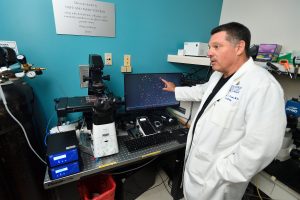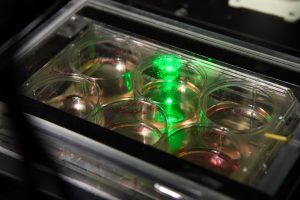Johns Hopkins UniversityEst. 1876
America’s First Research University
At their home in southern Virginia, Dave and Mary Stevens keep a book of photographs. Each page features members of the mortgage banking community from across the country, all wearing blue #StevensStrong wristbands.
“It’s a thick book,” Dave says.

The 35-year veteran of the mortgage industry served as the Obama administration’s assistant secretary of housing and FHA commissioner before joining the Mortgage Bankers Association as president and CEO. In 2016, five years into his tenure with the MBA, he was diagnosed with stage 4 prostate cancer at a Washington, D.C. hospital.
“Their protocol would have been basically a death sentence,” Dave says. “They had nothing unusual. And fortunately, through my research, I was able to find Ken Pienta at Brady who has a very aggressive protocol and has cutting-edge treatment options that just never would have been available at this very high tech, very modern urology clinic at another hospital.”
With Dr. Kenneth Pienta, director of research at The Brady Urological Institute, Dave and Mary began aggressive treatment against what the couple calls “our cancer.” Dave’s diagnosis hit especially hard for Mary, who lost her father to the same disease 30 years ago.
“When we were first diagnosed — I always say ‘we’ because it’s our cancer together — I was in tears,” Mary remembers. “Ken immediately said, ‘Well, there have been so many advances since your father passed away, so you’re in good hands with me.’”
Dave went into remission in February of 2017, but the cancer returned in summer 2018. Right now, his cancer is undetectable.
“Metastatic cancers are incurable. And currently, the treatments are an effort to try to kick it back into a corner and just add time. But once cancer spreads, you can’t contain it, and it’s a challenge,” Dave explains. “So we decided to raise money to help Ken with his team’s research and hopefully work to find a cure. Not for me, necessarily, but for future generations.”

Dave and Mary have a long history of rallying support for a cause. When the pair met, Mary was fundraising for a senate campaign. Shortly after Dave joined the MBA, the couple established a foundation that provides grants to families with critically ill children to help cover mortgage and rent payments.
They launched the Stevens Strong campaign in 2017 to put a spotlight on prostate cancer, which affects 1 in 9 men. Dave has been open about his diagnosis with his friends and colleagues in the mortgage industry. They, in turn, have rallied around the #StevensStrong campaign.
“Dave moved the industry when he stood in front of probably 1,000 people and announced he had cancer,” says Jim Deitch, CEO of Teraverde Management Advisors. “Just that personal affirmation and confidence inspired the room. It moved us to participate.”
Susan Stewart, CEO of SWBC Mortgage and MBA vice-chairman, says she didn’t know Dave and Mary well before the couple started #StevensStrong. But the common thread of cancer, and the effect it has on patients and their loved ones, made the campaign deeply personal.
“All of us have had friends who have had cancer. I’ve had cancer myself,” Stewart says. “The fact that there’s an opportunity to find a cure, or a solution, or save someone’s life. How can you not get involved? We can’t let these husbands and fathers go through this if there’s a solution and we can all get engaged.”
Last year, the campaign raised $327,000. Pienta’s team used the funds to purchase a state-of-the-art Nikon microscope that allows researchers to follow and track thousands of live cancer cells at a time without an incubator.
“So much of the way we study cancer right now involves looking at dead cancer cells and analyzing them,” Pienta explains. “This microscope is special because it has a set of optics, so to speak, that allow us to look at live cancer cells in a much broader view.”
In watching the populations of cancer cells over time through the microscope, Pienta’s team made a startling discovery. Hiding within the population of cancer cells is a special subtype of cancer cell, what the team has termed Keystone Cancer Cells. The discovery isn’t only a breakthrough for prostate cancer. It’s a breakthrough for all cancers.

“People knew these cells existed, but didn’t know they were going to be alive and mediating [therapy] resistance,” Pienta says. “What the microscope allowed us to do is show that they were actually not only not dead, but that they were surviving therapy that no cells should have been able to survive.”
Once the therapy is complete, the keystone cells divide and repopulate the cancer.
“We think that they’re the reason that when people die of cancer, they are dying because we can’t cure them with drugs,” Pienta says.
This year, Dave and Mary are reaching out to their network with an even greater goal in mind – $500,000 to support three full-time laboratory researchers for up to two years. They’ll be fully devoted to gathering the pre-clinical data necessary for Pienta’s team to secure federal funding.
“The more work we get done now, the more we get better data that allows more successful applications in the future,” Pienta says, adding that getting a return on a grant application can take 18 months to two years. “The more data we can generate through philanthropic dollars only means that we’ll get more traction with getting funding from the government.”
The team’s aim is to develop treatments specifically for the Keystone Cancer Cells. It’s the potential for innovation, along with Dave and Mary’s candor about their diagnosis, that inspired Dave’s colleagues to give.
“Anything I can do to help beat this terrible group of diseases, I’m in,” Deitch says. “Sometimes small investments in innovations pay big dividends.”
Interested in supporting the #StevensStrong campaign and Kenneth Pienta's innovative research?
Topics: Johns Hopkins Medicine, Fuel Discovery, Promote and Protect Health